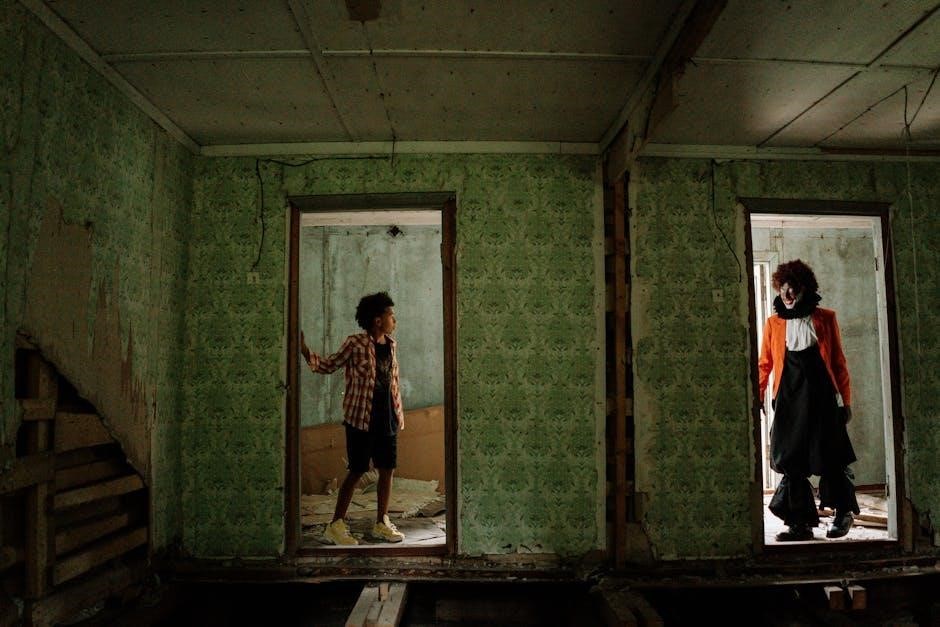the danger of a single story pdf

Chimamanda Ngozi Adichie’s TED Talk highlights the risks of single stories, which reduce complex identities to stereotypes, emphasizing the need for diverse narratives to enrich understanding․
1․1 Definition and Concept
The concept of “the danger of a single story” refers to the idea that oversimplifying complex identities or cultures through one narrative can lead to stereotypes and misunderstandings․ Chimamanda Ngozi Adichie explains that a single story is a narrative that defines an individual, group, or place based on a limited perspective, often ignoring the richness and diversity of their experiences․ This concept highlights how exposure to only one story about someone or something can create a skewed and incomplete understanding, perpetuating biases and limiting empathy․ Adichie emphasizes that single stories are not inherently false but become dangerous when they are the only story told about a person or culture․
1;2 Importance of Multiple Perspectives
Multiple perspectives are essential to counteract the danger of a single story, as they provide a more comprehensive understanding of complex identities and experiences․ Chimamanda Ngozi Adichie argues that single stories often reduce individuals or cultures to stereotypes, ignoring their full humanity․ By engaging with diverse narratives, we gain deeper insights into the multifaceted nature of people and places․ This fosters empathy, challenges biases, and promotes inclusivity․ Adichie emphasizes that hearing various stories broadens our worldview, allowing us to see beyond simplistic or misleading representations․ Ultimately, multiple perspectives enrich our understanding and help break down the barriers created by single stories․

Chimamanda Ngozi Adichie and Her TED Talk
Chimamanda Ngozi Adichie, a renowned Nigerian novelist, delivered a powerful TED Talk titled “The Danger of a Single Story,” exploring how storytelling shapes perceptions and stereotypes․
2․1 Biography of Chimamanda Ngozi Adichie
Chimamanda Ngozi Adichie, born on September 15, 1977, in Enugu, Nigeria, is a celebrated Nigerian novelist, nonfiction writer, and short story writer․ She grew up on a university campus in eastern Nigeria, where her father was a deputy vice-chancellor․ Adichie began reading early, devouring British and American children’s books, which later influenced her perspective on storytelling․ She studied medicine and pharmacy before moving to the U․S․ to pursue a degree in communication and political science․ Adichie gained global recognition for her novels, including Half of a Yellow Sun and Americanah, which explore themes of identity, culture, and gender․ Her TED Talk, “The Danger of a Single Story,” has become a landmark speech, emphasizing the importance of diverse narratives․ Adichie continues to advocate for storytelling as a tool for understanding and social change․
2․2 Key Themes of the TED Talk
Chimamanda Ngozi Adichie’s TED Talk explores the power of storytelling and the limitations of single narratives․ She discusses how single stories can create stereotypes and reduce complex identities to oversimplified representations․ Adichie shares personal anecdotes, such as her childhood reading of Western literature, which initially shaped her view of Africa․ She emphasizes how single stories lead to misunderstandings and the erasure of diverse experiences․ The talk highlights the importance of diverse storytelling in challenging stereotypes and fostering empathy․ By sharing multiple narratives, Adichie advocates for a more inclusive understanding of different cultures and identities, promoting a richer and more nuanced worldview․

The Impact of Single Stories
Single stories distort reality, perpetuating stereotypes and erasing diverse experiences, leading to cultural misunderstandings and division, as highlighted in Adichie’s talk and related discussions․
3․1 Stereotyping and Cultural Misunderstandings
The danger of a single story often leads to stereotyping, reducing complex cultures and identities to oversimplified narratives․ Adichie illustrates this with her childhood experience of reading Western literature that portrayed Africa as a land of poverty and savagery; These narratives ignore diversity, creating misunderstandings․ For instance, she shares how her roommate in America expected her to listen to “tribal” music, assuming all Africans shared the same culture․ Such single stories perpetuate stereotypes, fostering empathy failure and division․ They erase individuality, reducing people to preconceived notions rather than seeing their full humanity․ This highlights the urgent need for diverse storytelling to combat these harmful stereotypes and promote understanding․
3․2 Real-World Examples of Single Stories
Adichie illustrates single stories with real-world examples, such as Western literature’s portrayal of Africa as a land of poverty and savagery․ This narrative ignores the continent’s diversity, reducing it to stereotypes․ She shares how her American roommate expected her to listen to “tribal” music, reflecting a shallow understanding of African cultures․ Another example is the media’s tendency to frame developing countries solely through the lens of conflict or poverty, erasing their complexity․ These single stories create empathy failures, fostering division and misunderstanding․ They highlight the need for diverse narratives to challenge such reductionist views and promote a fuller understanding of global experiences and identities․

The Role of Storytelling in Shaping Perceptions

Storytelling profoundly shapes perceptions by framing how we view cultures, identities, and experiences․ It either enriches understanding or perpetuates stereotypes, highlighting the power of narratives in influencing worldviews․
4․1 Personal Stories from Adichie’s Life
Adichie shares personal anecdotes, such as growing up in Nigeria immersed in Western literature, which initially shaped her writing․ She recalls how her early stories mirrored foreign narratives, lacking African depth․ A pivotal moment occurred when an American roommate expressed surprise that Adichie didn’t listen to African folk songs, revealing the roommate’s single-story perspective․ These experiences highlight how personal stories can both reflect and challenge stereotypes, emphasizing the importance of diverse storytelling in breaking down cultural misunderstandings and fostering deeper understanding․
4․2 The Power of Literature in Forming Worldviews
Literature has the profound ability to shape how we perceive the world and its inhabitants․ Adichie emphasizes that the stories we consume influence our understanding of cultures and identities․ Growing up, she was exposed to Western literature that often portrayed Africa in a narrow, stereotypical way, limiting her initial worldview․ However, when she discovered African writers, her perspective expanded, revealing the richness of diverse narratives․ This highlights literature’s dual role: it can both constrain and liberate our understanding․ By engaging with varied stories, we can break down stereotypes and foster empathy, illustrating the transformative power of literature in shaping global perceptions․
Overcoming the Danger of a Single Story
Overcoming the danger involves embracing diverse narratives, challenging stereotypes, fostering understanding through varied perspectives, and promoting education and dialogue to enrich our global view․
5․1 The Importance of Diverse Storytelling
Diverse storytelling is crucial as it challenges single narratives, offering multifaceted views of cultures, identities, and experiences․ By amplifying varied voices, it fosters empathy and reduces stereotypes, enriching global understanding․ Adichie emphasizes how exposure to different stories broadens perspectives, helping individuals move beyond simplistic or biased views․ This diversity encourages critical thinking and cultural appreciation, ultimately creating a more inclusive society․ Through literature and personal accounts, diverse storytelling dismantles stereotypes, promoting a deeper understanding of human complexities․ It empowers individuals to question assumptions and engage with the world more thoughtfully, fostering a culture of empathy and mutual respect․
5․2 Practical Steps to Challenge Single Narratives
Challenging single narratives requires intentional actions․ First, seek out diverse sources and perspectives, engaging with stories from different cultures and viewpoints․ Second, encourage open conversations where multiple voices are heard and valued․ Third, support platforms and initiatives that amplify marginalized stories, promoting inclusivity in media and education․ Additionally, critically evaluate information for biases and challenge stereotypes in everyday interactions․ Educating oneself about the historical and social contexts of single stories is also essential․ By taking these steps, individuals can actively combat the limitations of single narratives, fostering a more nuanced and empathetic understanding of the world․ Collective effort is key to creating lasting change․
Embrace diverse narratives to avoid the pitfalls of single stories․ By seeking multiple perspectives, we foster empathy and understanding, creating a richer, more inclusive global community․
6․1 The Need for Continuous Awareness
Continuous awareness is essential to combat the persistence of single stories․ By actively seeking diverse perspectives, individuals can avoid the pitfalls of stereotyping and cultural misunderstandings․ Adichie emphasizes that single stories often create incomplete or misleading narratives, which can lead to harmful generalizations․ Regular engagement with varied sources of information helps to challenge and expand one’s worldview․ This ongoing process fosters empathy and understanding, enabling individuals to recognize and question dominant narratives․ Ultimately, sustained awareness promotes a more inclusive and nuanced appreciation of human experiences, aligning with Adichie’s call to move beyond simplistic representations of cultures and identities․
6․2 Encouraging a Culture of Empathy and Understanding
Encouraging a culture of empathy and understanding is vital to overcoming the danger of single stories․ By engaging with diverse narratives, individuals can develop a deeper appreciation for the complexity of human experiences․ Storytelling plays a crucial role in fostering empathy, as it allows people to connect with others’ lives and perspectives․ Adichie’s talk underscores the importance of creating spaces where multiple voices are heard and valued․ This cultural shift promotes inclusivity and reduces prejudice, enabling societies to move beyond simplistic or stereotypical views․ Ultimately, empathy and understanding are the foundations for building a more compassionate and interconnected world․